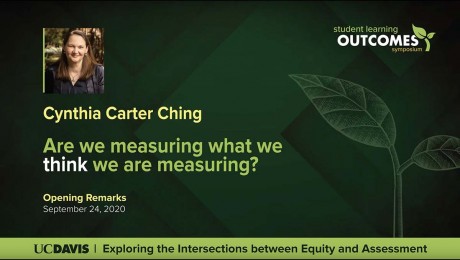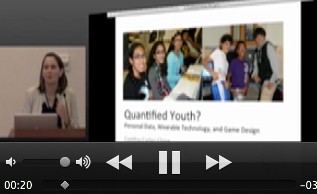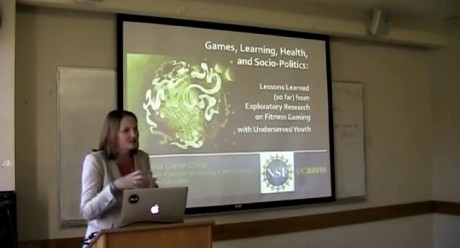Cynthia Carter Ching
Professor
Cynthia Carter Ching (she/her/hers) is Professor of Education and a former Interim Dean (2023-24) and Associate Dean for Academic Programs (2016-2020; 2022-23) in the UC Davis School of Education. During the COVID-19 pandemic, 2020-2022, she served as the UC Davis Interim Vice Provost and Dean of Undergraduate Education. In her research, funded by the National Science Foundation and others, she studies the intersection of technology, learning, collaboration, identity, and embodiment. Her work examines how children, youth, and adults represent and negotiate aspects of themselves via educational, recreational, and wearable technology in classrooms, in online environments, and in games.
Research Interests
Child Development; Collaborative Learning; Gender and technology; Learning in Informal Settings; Wearable Technology and Embodiment; Qualitative Methodology; Technology and Identity; Online Learning and Assessment
Education
University of California, Los Angeles
PhD, Education, 2000
Department: Psychological Studies in Education
University of California, Irvine, 1994
B.A. Psychology, Emphasis in Cognitive Science
Professional Experience
- Professor, School of Education, UC Davis, 2017-present
- Associate Professor, School of Education, UC Davis, 2007-2017
- Affiliated Faculty, Foods for Health Institute, UC Davis, 2012-2016
- Assistant Professor, College of Education, University of Illinois at Urbana-Champaign, 2001-2007
Administrative Appointments
- Interim Dean, School of Education, UC Davis, 2023-2024
- Interim Vice Provost and Dean of Undergraduate Education, UC Davis, 2020-2022
- Associate Dean for Academic Programs, School of Education, UC Davis, 2016-2020; 2022-2023
- Director of Undergraduate Programs, School of Education, UC Davis, 2008-2013
- Faculty Director, CTER (Curriculum, Technology, and Educational Reform) Online MA Program, College of Education, University of Illinois at Urbana-Champaign
- Chair, Technology Studies in Education, Interdisciplinary PhD Emphasis, College of Education, University of Illinois at Urbana-Champaign
Publications
Journal Publications
Lee, Y. & Ching, C. C. (in press). Beyond trust: Exploring contextual influences on embodiment technology. Learning, Media, and Technology.
Jadallah, C., Myer, R., Ballard, H., Ching, C. C., & Williams, A. (2024). “Seeing power” between young people and conservation professionals in the design of a community-based watershed monitoring initiative. Journal of the Learning Sciences, 33(1) 1-40.
Murray, K., Cannon, C., Ching, C. C., & Trexler, C. (2023). LGBTQ access to generalized youth development programs. Journal of Agricultural Education, 64(4).
Ching, C. C. & Hagood, D. (2019). Activity monitor gaming and the Next Generation Science Standards: Student reflections on data, measurement limitations, and personal relevance. Journal of Science Education and Technology, 28, 589-601.
Stewart, M., Hagood, D., & Ching, C. C. (2017). Virtual games and real-world communities: Environments that enable and constrain physical activity in games for health. International Journal of Game-Based Learning, 7, 1-19.
Ching, C. C., Stewart, M., Hagood, D., & Rashedi, R. (2016). Representing and reconciling personal data in a wearable technology gaming project. IEEE Transactions on Learning Technologies, 9, 342-353.
Schaefer, S., Ching, C. C., Breen, H., & German, J. B. (2016). Wearing, thinking, and moving: Testing the feasibility of fitness tracking with urban youth. American Journal of Health Education, 47, 8-16.
Ching, C. C., Schaefer, S., & Rashedi, R. (2015). Gaming health: A means-goals-agency framework for evaluating and designing physical activity games. Technoculture: An online journal of technology and society. https://tcjournal.org/vol5/gaminghealth
Ching, C. C. & Hursh, A. W. (2014). Peer modeling and innovation adoption among teachers in online professional development. Computers and Education, 73, 72-82.
Ching, K. L. & Ching, C. C. (2012). Past is prologue: Teachers composing narratives about digital literacy. Computers and Composition, 29, 205-220.
Evans, E., Ching, C. C., & Ballard, H. (2012). Volunteer guides in nature reserves: Exploring environmental educators’ perceptions of teaching, learning, place, and self. Environmental Education Research, 18, 391-402.
White, T., Booker, A., Ching, C. C., & Martin, L. (2012). Integrating digital and mathematical practices across contexts: A manifesto for mobile learning. International Journal of Learning and Media, 3 (3), 7-13.
Ching, C. C. & Hursh, A. W. (2010). “This site is blocked:” K-12 teachers and challenges of accessing peer-to-peer networks for education. E-Learning and Digital Media, 7, 338-345.
Ching, C. C. & Kafai, Y. B. (2008). Peer pedagogy: Student collaboration and reflection in a learning through design project. Teachers College Record, 110, 2601-2632.
Ching, C. C., Wang, X. C., Shih, M., & Kedem, Y. (2006). Digital photography and journals in a K-1 classroom: Toward meaningful technology integration in early childhood education. Early Education & Development, 17, 347-371.
Ching, C. C., Basham, J., & Jang, E. (2005). The legacy of the digital divide: Gender, SES, and early exposure as predictors of full-spectrum technology use among young adults. Urban Education, 40, 394-411.
Ching, C. C. (2005). Book review of Larry Cuban’s “Oversold and Underused: Computers in the Classroom.” Journal of Curriculum Studies, 37, 235-239.
Ching, C. C., Levin, J. A., Parisi, J. (2004). Classroom artifacts: Merging the physicality, technology, and pedagogy of higher education. Education, Communication, & Information, 4, 221-235.
Wang, X. C. & Ching, C. C. (2003). Social construction of computer experiences in a first-grade classroom: Social processes and mediating artifacts. Early Education & Development, 14, 335-361.
Ching, C. C. (2003). Book review of David Trend’s “Welcome to Cyberschool: Education at the Crossroads of the Information Age.” Teachers College Record, 105, 1394-1397.
Kafai, Y. B. & Ching, C. C. (2001). Talking science within design: Learning through design as a context for situating children’s scientific discourse. Journal of the Learning Sciences, 10, 323-363.
Ching, C. C., Kafai, Y. B., & Marshall, S. (2000). Spaces for change: Gender and technology access in collaborative software design. Journal of Science Education and Technology, 9, 67-78.
Gearhart, M., Saxe, G. B., Fall, R., Schlackman, J., Nasir, N., Ching, C. C., Bennet, T., Rhine, S., & Sloane, T. (1999). Opportunities to learn fractions in elementary mathematics classrooms. Journal of Research in Mathematics Education, 30, 286-315.
Kafai, Y. B., Franke, M. L., Ching, C. C. & Shih, J. C. (1998). Games as an interactive learning environment for fostering students’ and teachers’ mathematical inquiry. International Journal of Computers for Mathematical Learning, 3, 149-184.
Kafai, Y. B., Ching, C. C., & Marshall, S. (1997). Children as designers of educational multimedia software. Computers and Education, 29, 117-126.
Books and Book Chapters
Stewart, M. K., Hagood, D., & Ching, C. C. (2020). Using multi-modal data to examine equity in activity-monitor gaming within real-world communities. In M. Farber (Ed), Global perspectives on gameful and playful teaching and learning, pp 118-142. IGI Press.
Sellu, G. & Ching, C. C. (2019). The effectiveness of learning communities in increasing employee learning. In V. Kennon and S. Palsole (Eds), Global workplace learning handbook, pp. 501-519. Wiley Publishers.
Sellu, G. & Ching, C. C. (2019). Bridging the cultural gap in the global workplace. In V. Kennon and S. Palsole (Eds), Global workplace learning handbook, pp. 355-367. Wiley Publishers.
Ching, C. C. & Schaefer, S. (2014). Identities in motion, identities at rest: Engaging bodies and minds in fitness gaming research and design. In V. Lee (Ed.), Learning technologies and the body: Integration and implementation, pp. 201-219. Routledge.
Ching, C. C. & Foley, B. J. (Eds.) (2012). Constructing the self in a digital world. (Learning in Doing Series) Cambridge University Press.
Ching, C. C. & Foley, B. J. (2012). Introduction: Connecting conversations about technology, learning, and identity. In C. C. Ching & B. J. Foley (Eds.), Constructing the self in a digital world, pp. 1-13. Cambridge University Press.
Ching, C. C. (2012). Introduction to Part I: Developmental perspectives. In C. C. Ching & B. J. Foley (Eds.), Constructing the self in a digital world, pp. 17-25. Cambridge University Press
Ching, C. C. & Wang, X. C. (2012). “This is me:” Digital journals and young children’s technologies of the self. In C. C. Ching & B. J. Foley (Eds.), Constructing the self in a digital world, pp. 26-46. Cambridge University Press.
Ching, C. C., Wang, X. C., & Kedem, Y. (2005). Digital photo journals: A novel approach to addressing early childhood standards and recommendations. In S. Tettegah & R. Hunter (Eds.), Technology: Issues in administration, policy, and applications in K-12 schools, pp. 253-269. Kluwer Academic Publishers.
Ching, C. C., Basham, J., & Pianfetti, E. S. (2005). Technology in education, technology in life: Toward a holistic perspective on integration in preparing tomorrow’s teachers at the University of Illinois. In C. Vrasidas & G. Glass (Eds.), Current perspectives on applied information technologies, Volume 2: Preparing tomorrow’s teachers to use technology, pp. 225-240. Information Age Publishing.
Kafai, Y. B. & Ching, C. C. (2004). Children as instructional designers: Apprenticing and evaluating in the learning science by design project. In N. Seel & S. Dijkstra (Eds.), Instructional design: International perspectives. Volume 3: Curricula, Plans, and Processes, pp. 115-130. Erlbaum.
Kafai, Y. B., Ching, C. C., & Marshall, S. (2004). Learning affordances of collaborative software design. In M. Rabinowitz, F. C. Blumberg, & H. Everson (Eds.), The impact of media and technology on instruction, pp. 77-100. Lawrence Erlbaum Associates.
Ching, C. C., Kafai, Y. B., & Marshall, S. (2002). “I always get stuck with the books:” Creating a space for girls to access classroom technology. In N. Yelland & A. Rubin (Eds.), Ghosts in the machine: Women’s voices in research with technology, pp. 167-189. Peter Lang Publishers.
Papers in Published and Refereed Conference Proceedings
Ching, C. C., Lee, Y. J., Aldemir, T., Thomas Murphy, C., Martin, L., Borge, M., Halverson, E., & Bullington, T. (2024). Affect as outcome: Centering emotion and equity in learning sciences research. In C. Hoadley & X. Wang (Eds), Proceedings of the 4th Annual Meeting of the International Conference on the Learning Sciences. https://2024.isls.org/proceedings/
Hagood, D., Ching, C. C., & Schaefer, S. (2016) Integrating physical activity data with videogames with user-centered dashboards. Proceedings of the Sixth Annual Conference on Learning Analytics & Knowledge (LAK). ACM Press.
Worker, S. M. & Ching, C. C. (2016). Examining tensions among youth, educators, and curriculum as co-designers in a 4-H design-based learning program. In C.K. Loi, J. Polman, U. Cress, & P. Reimann (Eds.), Transforming Learning, Empowering Learners: Proceedings of the 12th International Conference on the Learning Sciences, pp. 322-329.
Ching, C. C., Schaefer, S., Stewart, M., & Hagood, D. (2015). Game your life: Health, behavior, and personal data gaming. In A. Oscher & C. Steinkuhler (Eds.), Proceedings of Games+Learning+Society. Madison, WI. ETC Press.
Stewart, M., Hagood, D., & Ching, C. C. (2015). A tale of two schools: Terrain and resources in virtual games and physical communities. In A. Oscher & C. Steinkuhler (Eds.), Proceedings of Games+Learning+Society. Madison, WI. ETC Press.
Schaefer, S. & Ching, C. C. (2015). Mixed methods assessment of health tracking by diverse urban youth. FAESB Journal (Federation of American Societies for Experimental Biology), 29, Supplement: Conference Papers, 902.16.
Moher, T., Ching, C. C., Lee, V. R., Enyedy, N., Danish, J., Lyons, L., et al (2014). Becoming reflective: designing for reflection on physical performances. Learning and Becoming in Practice: Proceedings of the International Conference on the Learning Sciences 2014, International Society of the Learning Sciences, 1273-1281.
Ching, C. C. & Hunicke, R. (2013). GET-UP: Health gaming for “the rest of your life.” In C. Steinkuehler & C. Williams (Eds.), Proceedings of Games + Learning + Society. New York: Teachers College Press.
Ching, C. C., Evans, E., Faber, E., Fields, D. A., & Nasir, N. S. (2010). “Wherever you go, there you are:” Examining the development and integration of individual identity across multiple domains and contexts. In Gomez, K., Lyons, L., & Radinsky, J. (Eds.) Learning in the Disciplines: Proceedings of the 9th International Conference of the Learning Sciences (ICLS 2010) – Volume 2. International Society of the Learning Sciences: Chicago IL, 69-76.
Ching, C. C. & Wang, X. C. (2006). Revealing and mediating young children’s memory and social cognition with digital photo journals. In S. Barab, K. Hay, & D. Hickey (Eds.), Making a Difference: Proceedings of the Seventh International Conference on the Learning Sciences (ICLS), pp. 85-91. Mahwah, NJ: Erlbaum.
Ching, C. C. & Wang, X. C. (2004). An emergent methodology for examining “collaborative space” in educational technology environments. In Y. Kafai, N. Enyedy, & B. Sandoval (Eds.), Embracing Diversity: Proceedings of the Sixth International Conference on the Learning Sciences (ICLS). Mahwah, NJ: Erlbaum.
Ching, C. C., Basham, J., Jang, E., Vigdor, L., & Parisi, J. (2004). Technology in pre-service teachers’ everyday lives and narrative autobiographies. Proceedings of the annual conference of the Society for Information Technology & Teacher Education (SITE). Atlanta, GA. 2004.
Ching, C. C. (2002). Constructing help: Models of collaboration and technology in project-based learning. In P. Bell, R. Stevens, & T. Satwicz (Eds), Keeping Learning Complex: The Proceedings of the Fifth International Conference on the Learning Sciences (ICLS). Mahwah, NJ: Erlbaum.
Ching, C. C. & Gallow, D. (2000). Fear and loathing in PBL: Faculty reactions to developing problem-based learning for a large research university. In Problem-Based Learning: Educational Innovations Across Disciplines. Selected papers from the Second Asia-Pacific Conference on Problem-Based Learning. Singapore, 2000.
Ching, C. C. (1999). “It’s not just programming:” Reflection and the nature of experience in learning through design. In C. Hoadley & J. Roschelle (Eds.), Proceedings of the Conference on Computers for Supporting Collaborative Learning, pp. 101-107.
Kafai, Y. B. & Ching, C. C. (1998). Talking science through design: Children’s science discourse during software design. In A. Bruckman, M. Guzdial, J. Kolodner, & A. Ram (Eds.), Proceedings of the International Conference of the Learning Sciences 1998. Charlottesville, VA: AACE, pp. 160-166.
Kafai, Y. B. & Ching, C. C. (1996). Meaningful contexts for mathematical learning: The potential of game-making activities. In D. Edelson & E. Domeshek (Eds.), Proceedings of the International Conference of the Learning Sciences 1996. Charlottesville, VA: AACE, pp. 164-171
Recent Presentations
Ching, C. C. & Lee, Y. K. (accepted) Person, place, politics: Considering “context” in online learning and online proctored exams. Paper to be presented at the annual meeting of the American Educational Research Association. Denver, CO: April 2025.
Lee, Y. K., & Ching, C. C. (accepted) Faculty perspectives on online proctoring: Adoption or rejection? Poster to be presented at the annual meeting of the American Educational Research Association. Denver, CO. April 2025.
Lee Y. J. & Ching, C. C. (2024, June) Inequities of anxiety and distrust in undergraduates’ remote-proctored exam experiences. Paper presented at the annual meeting of the International Society of the Learning Sciences (ISLS). Buffalo, NY: June 2024.
Ching, C. C. & Lee, Y. J. (2023, June). Self-care and nostalgia in a mid-pandemic freshmen seminar: Writing about embodiment and technology. Paper presented at Computers & Writing 2023. Davis, CA: June, 2023.
Lee, Y. J. & Ching, C. C. (2022, June) “Find ways to cope:” Games and gamification supporting college student mental health during the pandemic. Poster presented at Games+Learning+ Society conference. Irvine CA: June, 2022.
Jadallah, C., Murray, K., Ching, C. C., Ospina, M., Abusa, S., & Turpin, J. (2021, April). Science, identity, and science identity: Unpacking science experience GOALS for girls, trans, and non-binary youth. Paper presented at the Annual Meeting of the American Educational Research Association. (Virtual meeting)
Ching, C. C., Hagood, D., & Rashedi, R. (2017, April). Data literacy, objectivity, and constructing narrative: NGSS and alternative perspectives on physical monitor gaming. Paper presented at the Annual Meeting of the American Educational Research Association, San Antonio, TX.
Ching, C. C., Rashedi, R. & Schaefer, S. (2016, August). Revealing stealth health: Player agency in physical activity games. Poster presented at the Games+Learning+Society Conference. Madison, WI: August, 2016. [“Best Poster” Award Winner]
Hagood, D. & Ching, C. C. (2016, August). From “So cool” to “I’m bored:” Longitudinal analyses in wearable devices and physical activity gaming. Paper presented at the Games+Learning+Society conference. Madison, WI: August, 2016
Hagood, D. & Ching, C. C., & Schaefer, S. (2016, April). Integrating physical activity data in videogames with user-centered dashboards. Paper presented at the Learning Analytics and Knowledge conference. Edinburgh, Scotland: April 2016
Harris, E., Ballard, H., & Ching, C. C. (2016, April). Negotiations among students, scientists, and teachers in a school-based citizen science partnership. Paper presented at the Annual Meeting of the National Association for Research in Science Teaching. Baltimore, MD: April 2016
Ching, C. C., Hagood, D., Rashedi, R., & Stewart, M. (2016, April). Inside and outside: Boundaries of play in a wearable technology game for youth. Paper presented at the Annual Meeting of the American Educational Research Association. Washington DC: April 2016
Ching, C. C. (2015, January). Quantified youth? Personal data, wearable technology, and game design. Ignite talk presented at the NSF Cyberlearning and Future Technologies conference. Washington, DC: January, 2015.
Greiss-Hess, L., & Ching, C. C. (2014, July). Family contexts: A critical consideration in clinical trials. Paper presented at the National Fragile-X Foundation Conference. Los Angeles, CA: July, 2014.
Ching, C. C. & Schaefer, S. (2014, June). Devices, dashboards, games, and reflections: Quantitative data and the subjective experience of fitness technologies. Paper presented at the 12th International Conference on the Learning Sciences. Boulder, CO: June 2014.
Ching, C. C. (2014, April). “People who walk to school have a big advantage:” Physical sensor technology in life-wide and life-deep contexts. Paper presented at the Annual Meeting of the American Educational Research Association. Philadelphia, PA: 2014.
Ching, C. C. (2014, March). Designing a quantified-self model of fitness gaming for and with underserved youth. Presentation at the MacArthur Foundation Digital Media and Learning Conference. Boston, MA: 2014.
Ching, C. C. & Schaefer, S. (2014, January). Health in your pocket: Handheld, wearable, and everyday technologies for health promotion and education. Keynote presentation at the CalFresh California State Nutrition Educators’ Conference, Davis CA: 2014.
Ching, C. C. (2013, April). Jan Hawkins: A legacy for the twenty-first century. Selection Committee Chair’s remarks to the invited address for the AERA Division C Jan Hawkins’ Memorial Early Career Award for Humanistic Scholarship on Learning Technologies, at the Annual Meeting of the American Educational Research Association. San Francisco, CA: 2013.
Ching, C. C. (2011, May). Memory and disdain: Double-voiced narratives about teaching and technology. Paper presented at Computers & Writing. Ann Arbor, MI: 2011.
Ching, C. C. (2011, April). Shifting frames: Identity co-construction and renegotiation among teachers as online learners and novice bloggers. Paper presented at the Annual Meeting of the American Educational Research Association. New Orleans, LA: 2011.
Ching, C. C. & Hursh, A. W. (2010, April). “You guys gotta try this:” Peer modeling and open-source technology innovation among teachers in online professional development. Poster presented at the Annual Meeting of the American Educational Research Association. Denver, CO: 2010.
Wang, X. C., Chiu, M., & Ching, C. C. (2010, April). Deciphering participation: Statistical discourse analysis of young children’s participation at computers. Paper presented at the Annual Meeting of the American Educational Research Association. Denver, CO: 2010.
Wang, X. C., Chiu, M., & Ching, C. C. (2009, August). First-grade tutors’ and kindergarten tutees’ effects on each other. Poster presented at the Annual Meeting of the American Psychological Association. Toronto, Canada: 2009.
Ching, C. C. (2009, June). “Ubiquitous computing: The K-12 perspective.” Invited presentation at the opening town hall session for the Computers & Writing Conference, Davis, CA: 2009.
Ching, C. C. (2008, March). How will they find us? The (emerging) guide to graduate preparation in the Learning Sciences. Presentation to the business meeting of the Learning Sciences Special Interest Group (SIG) at the Annual Meeting of the American Educational Research Association. New York, NY: 2008.
Ching, C. C. & Wang, X. C. (2008, March). To see the world in a shutter click: A learner-centered approach to technology in early childhood. Jan Hawkins Memorial Invited Address given at the Annual Meeting of the American Educational Research Association. New York, NY, 2008.
Awards and Honors
- Jan Hawkins Early Career Award, 2007, AERA, Division C, Learning & Instruction
- Arnold O. Beckman Award for Research, 2002, University of Illinois
- Regents Dissertation Fellowship, 1999, University of California
- NIMH Doctoral Research Fellowship, 1997, University of California, Los Angeles
Grants and Fellowships
Ching, C. C. (PI), Schaefer, S. & Hunicke, R. Designing and
Exploring the Impact of Physical Activity Monitor Gaming on Youth
Fitness Practices
National Science Foundation—Cyberlearning: Transforming Education
(EAGER)
$268,000
IIS 1451446
9/01/2014 – 8/31/2016
Ching, C. C. (PI), German, B., Hauter, A., & Van Loan, M.
(Co-PIs). Gaming to Educate Teens about Understanding
Personal Health (GET-UP).
National Science Foundation – Cyberlearning: Transforming
Education (EXP)
$550,000
IIS 1217317
9/01/2012 – 8/31/2015
Ching, C. C. (PI) Points of View: Digital Cameras
in an Early Childhood Classroom
University of Illinois Campus Research Board
$8,479
Ching, C. C. (PI) Technology, Identity, Lifestyle, and
Education Study (TILES).
University of Illinois Campus Research Board
$21,834.00
Ching, C. C. (PI) Apprenticeship, Education, &
Technology
University of California Board of Regents Dissertation
Fellowship
$15,000
Service
Editorial Board Service
- Associate Editor, Educational Researcher, 2019-2020
- Associate Editor, Journal of the Learning Sciences, 2008-2014
- Editorial Board, American Educational Research Journal, 2010-2012
- Editorial Board, Journal of the Learning Sciences, 2004-2008; 2014-2021
Ad-hoc & Invited Manuscript Reviews
• Computer Science Education
• Teachers College Record
• Review of Educational Research
• American Educational Research Journal
(AERJ)
• Cognition & Instruction
• Field Methods
• Educational Theory
• Early Education & Development
• Computers & Education
• Convergence: The Journal of New Media
Development
• Journal of Computer-Mediated
Communication
• Journal of Educational Computing Research
• Technology, Humanities, Education, &
Narrative (THEN)
Granting Organizations
- National Science Foundation, Grant Review: Human-Centered Computing, Cyberlearning, Advancing Informal Science Education, 2005-present
- National Science Foundation, Project Mentor, Diversifying NSF Initiative – Cyberlearning program, 2015-2016
Leadership in National Organizations
- Chair, AERA Division C Hawkins Early Career Award Selection Committee, 2023-2025
- AERA Best Student Paper SIG-LS Selection Committee, 2022-2023
- Selection Committee: ISLS Best Paper Journal of the Learning Sciences 2019, 2019
- AERA Division C Hawkins Early Career Award Selection Committee, 2012-2018
- Education Committee, International Society of the Learning Sciences (ISLS), 2002-2011
- Chair, AERA Special Interest Group: Education, Science, and Technology (SIG-EST), 2004-2005
Conferences
- Hybrid Accessibility Organizing Committee, International Conference on the Learning Sciences, 2023-2025
- Organizing committee, Computers and Writing Conference 2023
- AERA Research-in-Practice Graduate Student Faculty Mentor, 2023
- Program committee, International Conference on the Learning Sciences (ICLS), 2014; 2016
- Doctoral Consortium Faculty, Games+Learning+Society, 2015
- Selection committee: AERA SIG LS/ATL Best Student Paper Award, 2014-2016
- AERA Division C Graduate Student Mentoring Workshop – Invited Mentor, 2013
- Organizing committee, Computers and Writing Conference 2009
- Organizing committee, Computer Supported Collaborative Learning Conference (CSCL), 2007
- Doctoral consortium faculty, International Conference on the Learning Sciences (ICLS), 2004
- Conference proposal reviews: AERA, ICLS, CSCL, Computers & Writing, 1998-present
Memberships in Scholarly Societies and Organizations
- American Educational Research Association
- International Society of the Learning Sciences
UC Davis Service
As Interim Vice-Provost and Dean of Undergraduate Education
- Provosts’ Leadership Council, 2020-2022
- Chancellor’s Advisory Group on COVID and Remote Operations, 2020-2022
- Council of Deans, 2020-2022
- Council of Vice-Provosts, 2020-2022
- Academic Senate Undergraduate Council (Ex-officio) , 2020-2022
- Diversity, Equity, and Inclusion Advisory Board, 2020-2022
- Western Association of Schools and Colleges Accreditation Liaison Officer (ALO) , 2020-2021
Campus
- Provost’s Task Force for Remote Instruction, Spring 2020
- Campus Executives Global Strategy Committee, 2019-present
- Chancellor’s Advisory Committee on HSI (Hispanic-Serving Institution) Status, 2020-present
- Aggie Launch Initiative, Curricular Integration Team, 2020-present
- Institutional Review Board (IRB), Office of Research, 2014-2016
- Academic Senate Council of Department Executives, 2008-2009
- Provost’s Advisory Committee on the Status of Women at Davis, 2010-2013
- Academic Senate Undergraduate Committee on Special Academic Programs, 2010-2012
- Academic Senate Ad-Hoc Representative from School of Education, 2011-2012; 2014-2016
School of Education
- Chair, Faculty Executive Committee, 2008-2009
- Search Committee, Learning and Adolescent Development, 2008-2009
- Academic Programs Committee, 2008-2015
- Faculty Secretary and Executive Committee, School of Education, 2007-2008
- Undergraduate Minor Advisory Committee, 2007-2008
Courses Taught at UC Davis
FYS 013: (First-Year Seminar) Learning and Engagement with
Embodiment and Games
EDU 110: Learning, Human Development, and Schools
(Undergraduate)
EDU 199: Learning, Human Development, and Schools (Teacher
Education)
EDU 185: Learning in a Digital Age (Undergraduate)
EDU 292: Collaborative Learning (MA/PhD)
EDU 292: Introduction to the Learning Sciences (PhD)
EDU 235: Interview Methods (PhD)
EDU 211: Sociocultural Theories of Learning (MA/PhD)
EDU 292: Digital Learning and Digital Literacies (PhD)
EDU 201: Introduction to Qualitative Research Methods
(MA/PhD)
EDU 298: Writing for Preliminary Exams (PhD)
Are We Measuring What We Think We’re Measuring?
Dr. Cynthia Carter Ching addresses the 2020 Student Learning Outcomes Symposium at UC Davis
On September 24, 2020, Interim Vice Provost and Dean of Undergraduate Education Cynthia Carter Ching presented on the intersections of assessment and equity at the 2020 UC Davis Student Learning Outcomes Symposium. Ching addressed the relationship between student learning outcomes assessment and equity today, drawing on her experience as Interim Vice Provost and as an education scholar who worked in assessment development in K-12 settings.
Quantified Youth? An Overview of Research into Gaming and Health
Cynthia Carter Ching, associate professor of learning and mind sciences
In January 2015, Cynthia Carter Ching, presented lessons learned about her research into the use of gaming to impact youth health at a two-day Cyberlearning Summit sponsored by the National Science Foundation (NSF).
Games, Learning, Health and Socio-Politics
Cynthia Carter Ching, associate professor of learning and mind sciences
Watch this presentation by Cynthia Carter Ching recorded on October 14, 2013 at a colloquium sponsored by Cognition & Development and SESAME programs at UC Berkeley’s Graduate School of Education.
In the presentation titled “Games, Learning, Health and Socio-Politics: Lessons Learned from Exploratory Research on Fitness Gaming with Underserved Youth,” Ching outlines findings from the first year of her NSF-funded cyberlearning grant.
Designing and Exploring the Impact of Physical Activity Monitor Gaming on Youth Fitness Practices
Led by associate professor Cynthia Carter Ching, this one-year study, funded by the National Science Foundation as an EAGER (Early Concept Grants for Exploratory Research) project, brings together learning sciences and health researchers with professional game designers to develop a behavioral change model for physical activity-monitor gaming that is thus far unique in the existing literatures on games and learning, games for health, and health education/intervention.
“People Who Walk to School Have a Big Advantage”: Can Gaming Improve Youth Health?
Posted May 2014
As the growth of gaming has skyrocketed among nearly all segments of society, researchers in health, technology, and education have been asking whether video games can be leveraged to improve health outcomes for youth.
Designing Video Games to Put Kids in Charge of Their Own Health
November 2012
As any parent knows, video games are a fact of life. So, too, is the childhood obesity epidemic in America. According to UC Davis School of Education Professor Cynthia Carter Ching, it is easy to blame one for the other.
But Ching and other researchers are turning this equation on its head in a new project that uses gaming to put youth in charge of their health.
Cynthia Carter Ching
What About the “T” IN STEM? Is Technology the Answer?
Among the oft-mentioned challenges in education is the challenge of preparing students for success in the twenty-first century workforce. Technology is just as often cited as the solution.
The hope is that the use of technology in the classroom (for example, the use of video or an interactive whiteboard) will raise student performance, particularly in math and science. But it turns out that unless the instruction itself is challenging and engaging, the use of technology won’t make any difference.
“Technology is just a tool,” according to education professor Cynthia Carter Ching. “Live streaming of a boring lecture is still boring.”
Tackling the digital divide in schools
Cynthia Carter Ching-2009
Cynthia Carter Ching, an expert on technology and education, represented the K-12 perspective at “Computers & Writing 2009: Ubiquitous and Sustainable Computing,” a conference hosted at UC Davis during the summer 2009.













